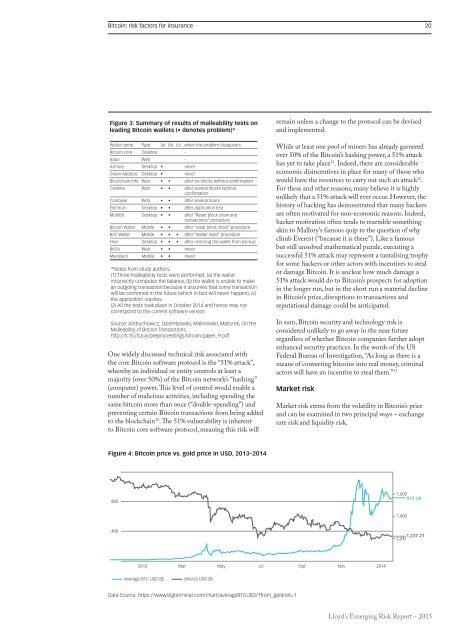bitcoin final
bitcoin final
bitcoin final
You also want an ePaper? Increase the reach of your titles
YUMPU automatically turns print PDFs into web optimized ePapers that Google loves.
Bitcoin: risk factors for insurance 20Figure 3: Summary of results of malleability tests onleading Bitcoin wallets (• denotes problem)*Wallet name Type (a) (b) (c) when the problem disappearsBitcoin core Desktop -Xapo Web -Armory Desktop • neverGreen Address Desktop • neverBlockchain.info Web • • after six blocks without confirmationCoinkite Web • • after several blocks withoutconfirmationCoinbase Web • • after several hoursElectrum Desktop • • after application testMultiBit Desktop • • after “Reset block chain andtransactions” procedureBitcoin Wallet Mobile • • after “reset block chain” procedureKnC Wallet Mobile • • • after “Wallet reset” procedureHive Desktop • • • after restoring the wallet from backupBitGo Web • • neverMycelium Mobile • • never*Notes from study authors:(1) Three malleability tests were performed: (a) the walletincorrectly computes the balance, (b) the wallet is unable to makean outgoing transaction because it assumes that some transactionwill be confirmed in the future (which in fact will never happen), (c)the application crashes.(2) All the tests took place in October 2014 and hence may notcorrespond to the current software version.Source: Andrychowicz, Dziembowski, Malinowski, Mazurek, On theMalleability of Bitcoin Transactionshttp://fc15.ifca.ai/preproceedings/<strong>bitcoin</strong>/paper_9.pdfOne widely discussed technical risk associated withthe core Bitcoin software protocol is the “51% attack”,whereby an individual or entity controls at least amajority (over 50%) of the Bitcoin network’s “hashing”(computer) power. This level of control would enable anumber of malicious activities, including spending thesame <strong>bitcoin</strong> more than once (“double-spending”) andpreventing certain Bitcoin transactions from being addedto the blockchain 10 . The 51% vulnerability is inherentto Bitcoin core software protocol, meaning this risk willremain unless a change to the protocol can be devisedand implemented.While at least one pool of miners has already garneredover 50% of the Bitcoin’s hashing power, a 51% attackhas yet to take place 11 . Indeed, there are considerableeconomic disincentives in place for many of those whowould have the resources to carry out such an attack 12 .For these and other reasons, many believe it is highlyunlikely that a 51% attack will ever occur. However, thehistory of hacking has demonstrated that many hackersare often motivated for non-economic reasons. Indeed,hacker motivation often tends to resemble somethingakin to Mallory’s famous quip to the question of whyclimb Everest (“because it is there”). Like a famousbut still unsolved mathematical puzzle, executing asuccessful 51% attack may represent a tantalising trophyfor some hackers or other actors with incentives to stealor damage Bitcoin. It is unclear how much damage a51% attack would do to Bitcoin’s prospects for adoptionin the longer run, but in the short run a material declinein Bitcoin’s price, disruptions to transactions andreputational damage could be anticipated.In sum, Bitcoin security and technology risk isconsidered unlikely to go away in the near futureregardless of whether Bitcoin companies further adoptenhanced security practices. In the words of the USFederal Bureau of Investigation, “As long as there is ameans of converting <strong>bitcoin</strong>s into real money, criminalactors will have an incentive to steal them.” 13Market riskMarket risk stems from the volatility in Bitcoin’s priceand can be examined in two principal ways – exchangerate risk and liquidity risk.Figure 4: Bitcoin price vs. gold price in USD, 2013–20148001,600851.581,4004001,237.211,2002013 Mar May Jul Sep Nov 2014Average BTC USD ($) XAUUS USD ($)Data Source: https://www.bigterminal.com/chart/averageBTCUSD/?from_goldnet=1Lloyd’s Emerging Risk Report – 2015


